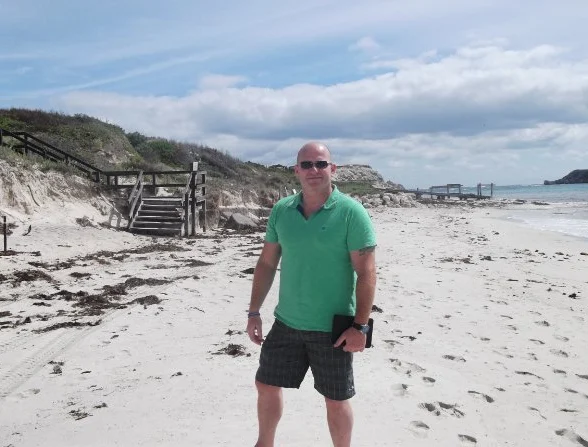Welcome to Therapy Insight
Helping you to find your best way forward within a safe, supportive, caring and holding space.
Welcome, and thank you for visiting Therapy Insight Counselling. I am a Trainee Counsellor in the final stages of training at the Bath Centre for Psychotherapy and Counselling (BCPC). I offer face to face counselling in The Vale of Glamorgan, and online.


A safe, confidential space
As a therapist in the final stages of training, I am able to provide a safe, confidential space for you to examine your life as you make sense of your experiences and how these may have shaped who you are, and how you see yourself today. I am a trainee person-centred integrative therapist which means I am empathic, non-judgemental and aim to help you to gain insight into your own tools and resources to find the best way forward for you at the time that is right for you.
About Me
I live by the sea in Barry, South Wales with my wife and 4 year old Beagle, Dennis. My professional work life has centred around helping others to manage their wellbeing with time spent in the British Army, National Police Training, ten years in teaching, a brief spell in South Australia working for a mental health charity and six years for Macmillan Cancer Support. I also work for the NHS Wales Veterans Service supporting Veterans with trauma. From these helping roles I have been naturally led towards a more formal training and role in Counselling, with the aim of practicing as an Integrative Therapist once fully qualified, both in person in The Vale of Glamorgan, and online.

My Qualifications
I hold the following academic qualifications:
Diploma in Humanistic and Integrative Counselling (pending final submission)
PG Cert Health Psychology
PG Cert Coaching & Mentoring
MA Education
BA (Hons) Education
PGCE & QTS
I am also conducting research for the award of PhD Health Sciences into Vicarious Traumatisation, Compassion Fatigue and Burnout and how to manage self-care sustainably for those in helping roles.
What issues can I help with?
Here are a few of the more common difficulties that can be supported through counselling:
Trauma
Post Traumatic Stress
Complex PTSD
Attachment issues
Relationship issues
Abuse
Family issues
Anxiety
Depression
Anger
Self worth/self-esteem
Grief, loss, or bereavement
Addiction
Sexuality
My location
My counselling practice is located in Westward Rise, Barry, Vale of Glamorgan, CF62 6PP.
I offer face to face counselling in Barry, The Vale of Glamorgan and also see clients from the surrounding areas of Cardiff, Bridgend, Llantwit Major, Cowbridge, Talbot Green and Miskin.
I also provide online counselling and can see clients throughout the UK.
Fees & availability
Sessions last 50 minutes, usually on a weekly basis. I do provide a limited number of spaces for those on low-income, or for students; please contact me for availability and cost. Initial assessment meetings usually last for 75 minutes, please email me to enquire.
Please note that if you wish to cancel an appointment, I require 48 hours notice otherwise, you will still need to pay for any missed appointments.
I accept payment by bank transfer or cash.
Get in touch
Feel free to contact me if you have any questions about how counselling works, or to arrange an initial assessment appointment. This enables us to discuss the reasons you are thinking of coming to counselling, whether it could be helpful for you and whether I am the right therapist to help.
You can also call me on +447961883130 if you would prefer to leave a message or speak to me first. I am happy to discuss any queries or questions you may have prior to arranging an initial appointment.
All enquires are usually answered within 24 hours, and all contact is strictly confidential and uses secure phone and email services.
Some frequently asked questions
Many therapists tend to view Counselling as ‘short-term’ work; when someone has a problem that can be looked at and discussed in a clearly resolvable way. This work often requires undertaking sessions for a certain number of weeks, to explore, discover and clarify a way forward. Therapy is a word used more to describe ‘long-term’ work; discussion that tends towards substantial issues and things that might be life-changing on a deeper level.
Whether counselling or therapy work best as a short or long-term option depends on the client though, and the difficulties they are facing. In some cases counselling can prove helpful as a continuing, longer-term option, or therapy can help resolve an issue in just a few sessions.
There’s no fixed or ideal length of time for the counselling process; it varies from person to person and will often depend on the depth of the issues they are facing. While I can work on an open-ended basis with clients, I find it is helpful for us to both agree before we start on undertaking a certain number of sessions and reviewing where we are at once we reach that point. You are able to decide how long your therapy will last, and in return my aim is to make sure therapy continues for only as long as it is of benefit to you.
This depends on what your needs are. Some people find that after only a very few sessions they have some clarity and focus and are ready to end the therapy. Other people value the ongoing support and relationship with me and will continue to come for weeks, months, or even years. There is no 'one-size-fits-all' when it comes to therapy.
My aim is to offer you a first appointment, known as an assessment session within 1-2 weeks, this is once we receive your completed client pack back. However, waiting times will vary according to pressure on our resources, your own availability and the service you seek.
An appointment to our short term counselling, which is not subsidised, can be offered within about one week.
Confidentiality is one of the main ways in which therapy differs from many other forms of helping for example, talking to friends or family can rarely offer the same degree of confidentiality as talking to a counsellor. Because of this confidentiality, you will find that as you get used to coming for therapy you are freer to talk about whatever you wish to.
No therapist can offer 100% confidentiality: there are some situations where the law requires disclosure of risk (e.g. certain child protection issues) and in common with most other therapists, there are some situations where I may not be able to keep total confidentiality. In particular, if someone tells me that they are thinking of harming themselves in a way that I believe puts them at serious risk, or if someone tells me that they are doing something that could put others at risk, I may not be able to keep such information confidential. However, breaking confidentiality is rare, and only happens after talking to the person concerned.
When you come for counselling it's important that you feel free to talk about whatever is important to you. Sometimes, you may not be clear what those issues are. Having a friend or family member with you is not usually helpful because they may have their own agenda for you. Even if this is just that they want to be supportive, or want you to 'get better', this agenda can prevent us opening issues up. When you come for therapy, you may need to explore thoughts or behaviours about which you feel ashamed or embarrassed and you may censor yourself so as not to hurt someone, or you may find that what they want you to talk about is not really what you need to discuss.
Sometimes, family/friends can even be part of an underlying issue which needs to be aired and discussed. Usually, people who ask this question are nervous about coming for a session alone, or they are anxious for the person who is thinking about arranging sessions. This anxiety is to be expected and you will not be forced to talk about anything you feel uncomfortable about - but you do need to be able to talk about whatever is important. For this reason, I do not see clients accompanied by friends or family
© Therapy Insight
powered by WebHealer

